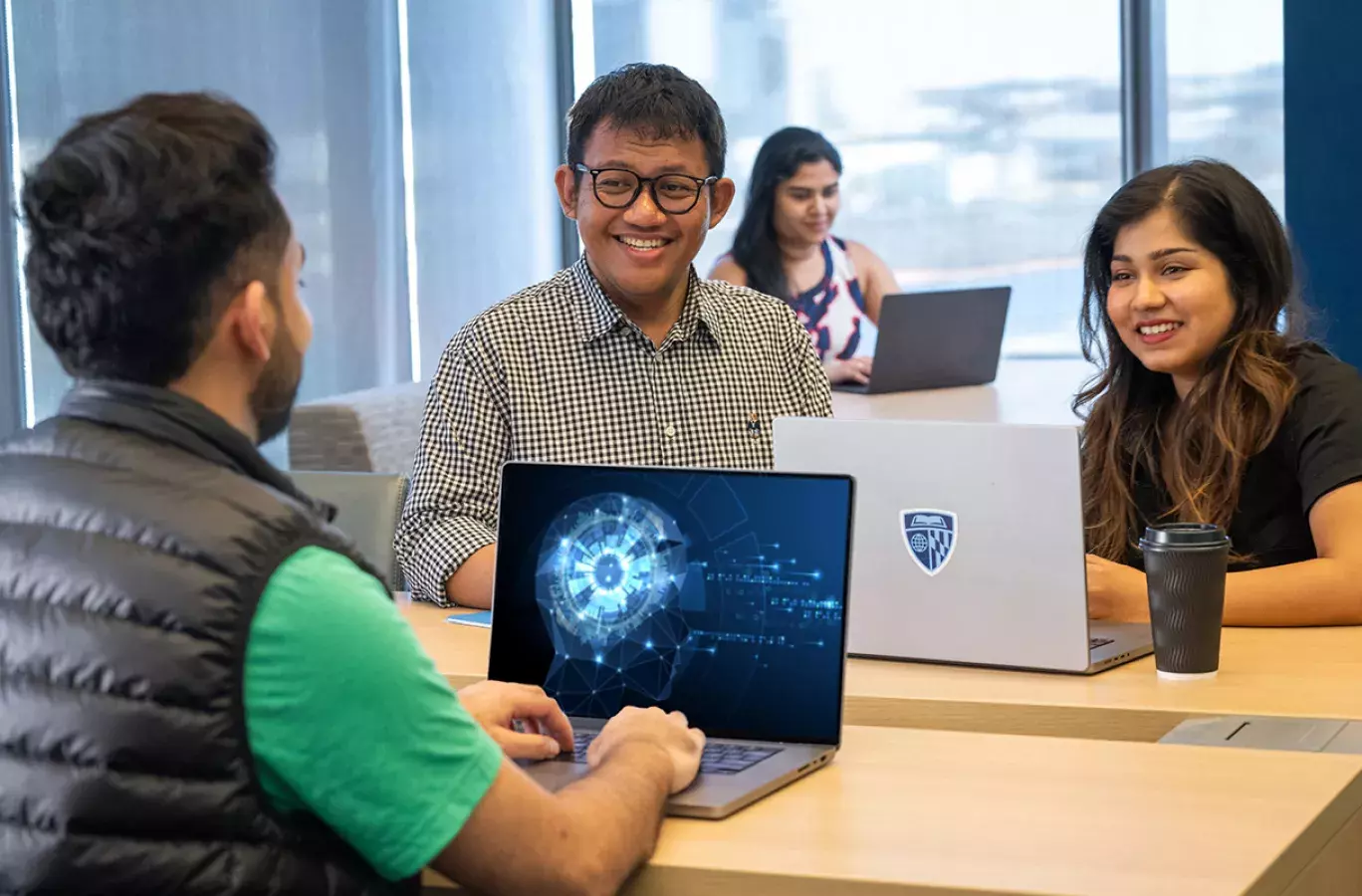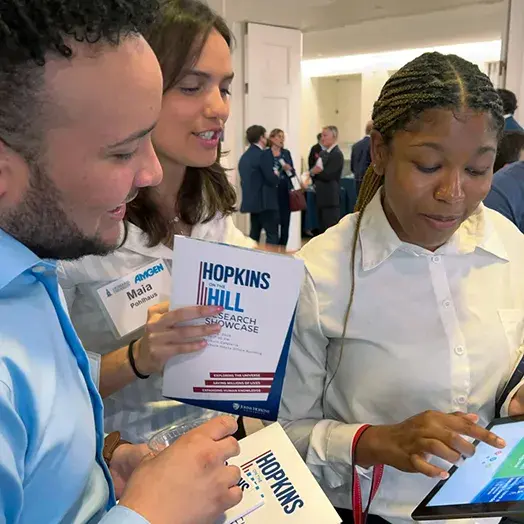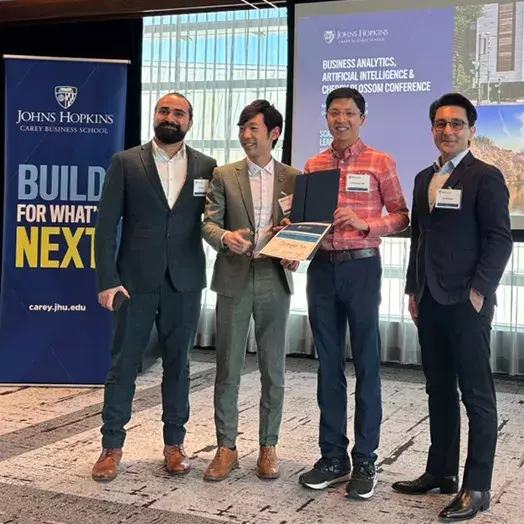Carey & India
Carey & India

Office of Student Affairs
Unlock global opportunity with a STEM-designated graduate business degree from Johns Hopkins Carey Business School
A world-class business education from Johns Hopkins Carey Business School offers Indian students the opportunity to transform their careers and make a global impact. With full-time MBA and Master of Science programs located in Washington, D.C., and Baltimore, Maryland, Carey equips future leaders with the technical expertise, real-world experience, and expansive global network needed to thrive in today’s data-driven economy. Designed with international students in mind, our programs offer STEM designations that enable up to three years of Optional Practical Training (OPT) in the United States-providing a powerful launchpad for career success.

Why Indian Students Choose Carey Business School
Global prestige:
Join one of the most respected universities in the world — Johns Hopkins University—ranked among the top in health care, research, and innovation.
STEM advantage:
Our full-time MBA and four MS programs are STEM-designated, offering eligible students up to 36 months of Optional Practical Training (OPT) in the U.S.
Location benefits:
Study in Washington, D.C., or Baltimore—two major innovation hubs connected to health care, finance, government, and entrepreneurship.
Alumni network:
With over 30,000 Carey graduates and 260,000+ Johns Hopkins alumni worldwide, you will have access to a vibrant group of leaders and entrepreneurs.
Employers Hiring Carey Graduates:
- AMAZON
- ASTRAZENECA
- BOEING
- DELOITTE
- EY
- GOLDMAN SACHS
- JP MORGAN CHASE & CO.
- LOCKHEED MARTIN
- MCKINSEY & COMPANY
- MICROSOFT
- PwC
- T ROWE PRICE FOUNDATION
of Indian students attending Flexible MBA employed in the U.S. within 90 days of graduation
of FT MBA graduates from India employed in the U.S. within 90 days of graduation
of PT MSA graduates from India employed in the U.S. within 90 days of graduation
Programs at Carey
-
The full-time MBA at Carey is a two-year, STEM-designated program based in Washington, D.C., designed for students ready to lead change and innovate across industries. The curriculum emphasizes data-informed decision-making, leadership development, and hands-on application through real-world business projects. Students can choose from two optional specializations, Analytics, Leadership, and Innovation or Health, Technology, and Innovation, allowing them to tailor their studies toward emerging global challenges. During the second year, students can further customize their education by earning certificates in areas such as Artificial Intelligence for Business, Financial Management, or Digital Marketing.
Experiential learning is at the core of the MBA experience, with opportunities like the Innovation Field Project, Big Data Consulting, and global industry immersions. Indian MBA graduates benefit from strong career outcomes, with the majority securing employment in the U.S. within 90 days of graduation.
-
Carey’s one-year, full-time Master of Science programs are built for recent graduates and early-career professionals seeking deep expertise in high-demand fields. Four of the seven programs are STEM-designated, offering a strong advantage for Indian students interested in career opportunities in the United States. The MS programs include four STEM-designated programs Business Analytics and Artificial Intelligence, Finance, Information Systems and Artificial Intelligence for Business, and Marketing. Carey also offers an MS in Management, Health Care Management, and Real Estate and Infrastructure.
Each program combines foundational business education with technical specialization, giving students the tools to lead in today’s rapidly evolving industries. Students engage in award-winning case competitions, client-based consulting labs, and international business treks. Top employers like Deloitte, Amazon, AstraZeneca, and JP Morgan Chase regularly recruit Carey MS graduates

“The Community Consulting Lab helped me apply my classroom learning to real client challenges—it made my education real.”
- Dev Goyal, MS Marketing ’23
Career Outcomes & U.S. Work Opportunities
Career outcomes are a central focus at Carey. The Career & Life Design team offers dedicated support to international students, including career coaching, employer networking events, and visa guidance. Through personalized advising, job search preparation, and professional development tools like LinkedIn Learning and Handshake, students sharpen their professional skills and gain a competitive edge. Carey’s robust employer network includes leading companies such as McKinsey & Company, EY, Microsoft, and Lockheed Martin, all of which have hired Carey graduates in recent years.
Indian students also benefit from the strength of the global alumni network, with connections across industries and geographies. Mentoring programs, regional meetups, and global treks help students form lasting relationships with industry leaders and Carey graduates around the world.
Scholarships and financial aid
Carey Business School is committed to making graduate business education accessible and affordable. Several scholarships are available to full-time MBA and MS students, including the Carey Business Fellowship, Forté Fellowship (for MBA students), and numerous endowed scholarships funded by alumni and corporate partners. Johns Hopkins also provides multiple payment plan options and accepts international payments through Flywire and Covera. Our admissions and financial aid teams are available to support you through the process and help you understand your options.
Life in the US: Baltimore and Washington, D.C.
Carey students study in two of the most dynamic cities in the United States. In Washington, D.C., students learn at the brand-new Johns Hopkins Bloomberg Center on Pennsylvania Avenue—just steps from Capitol Hill and surrounded by think tanks, policy leaders, and global organizations.
In Baltimore, the Carey campus sits in Harbor East, a growing hub for entrepreneurship, technology, and health care innovation. Both locations offer access to professional opportunities, cultural institutions, and a supportive Indian student community.

Career support and global networking

Sharpen your professional skills to become a leading candidate in the workforce with help from Carey’s Career & Life Design team. Our career and leadership coaches are committed to supporting you throughout your time at Carey with resources and experiences that include:
Featured News & Events

research
Can AI provide real-time health care support?
business of health
Carey alumna’s award-winning company uses AI to advance life-saving research
Innovation/tech
Carey AI conference examines the life-saving applications of decision-focused learning
research
Can AI provide real-time health care support?
business of health
Carey alumna’s award-winning company uses AI to advance life-saving research
Innovation/tech
Carey AI conference examines the life-saving applications of decision-focused learningStudent organizations
Student organizations are your chance to network with classmates from across all of Johns Hopkins Carey Business School programs, put your skills to the test with case competitions and conferences, and make friends along the way.
Indian Student Association
The Indian Student Association aims to support students across various programs at Carey. This is a student-centered organization focused on careers and navigating U.S. business culture.
Contact: Indian Student Association
Johns Hopkins University Office of International Services
The Johns Hopkins University Office of International Services assists international students with the visa and immigration process. New degree-seeking students should consult the Office of International Students website for more information on the visa process and transitioning to life at Carey. All questions should be directed to Office of International Services via phone at 667-208-7001, or email at ois@jhu.edu.
Join a global network of alumni
With more than 25,000 business alumni living, working, and innovating around the globe, Johns Hopkins Carey Business School is a hub of influence and opportunity. No matter if you are on campus or on the other side of the world, stay connected with Johns Hopkins Alumni around the world. Tap into our regional alumni groups in India, Beijing, South Korea, Shanghai, South China, and other cities around the world.
Visa and immigration
The Johns Hopkins University Office of International Services assists international students with the visa and immigration process. New degree-seeking students should consult the Office of International Students website for more information on the visa process and transitioning to life at Carey. All questions should be directed to Office of International Services via phone at 667-208-7001, or email at ois@jhu.edu.
Connect with us
Whether you’re preparing to launch your global business career or ready to deepen your expertise in a specialized field, Johns Hopkins Carey Business School offers the tools, network, and support you need to succeed. Schedule a one-on-one conversation with a recruiter, request more information, or begin your application today.
